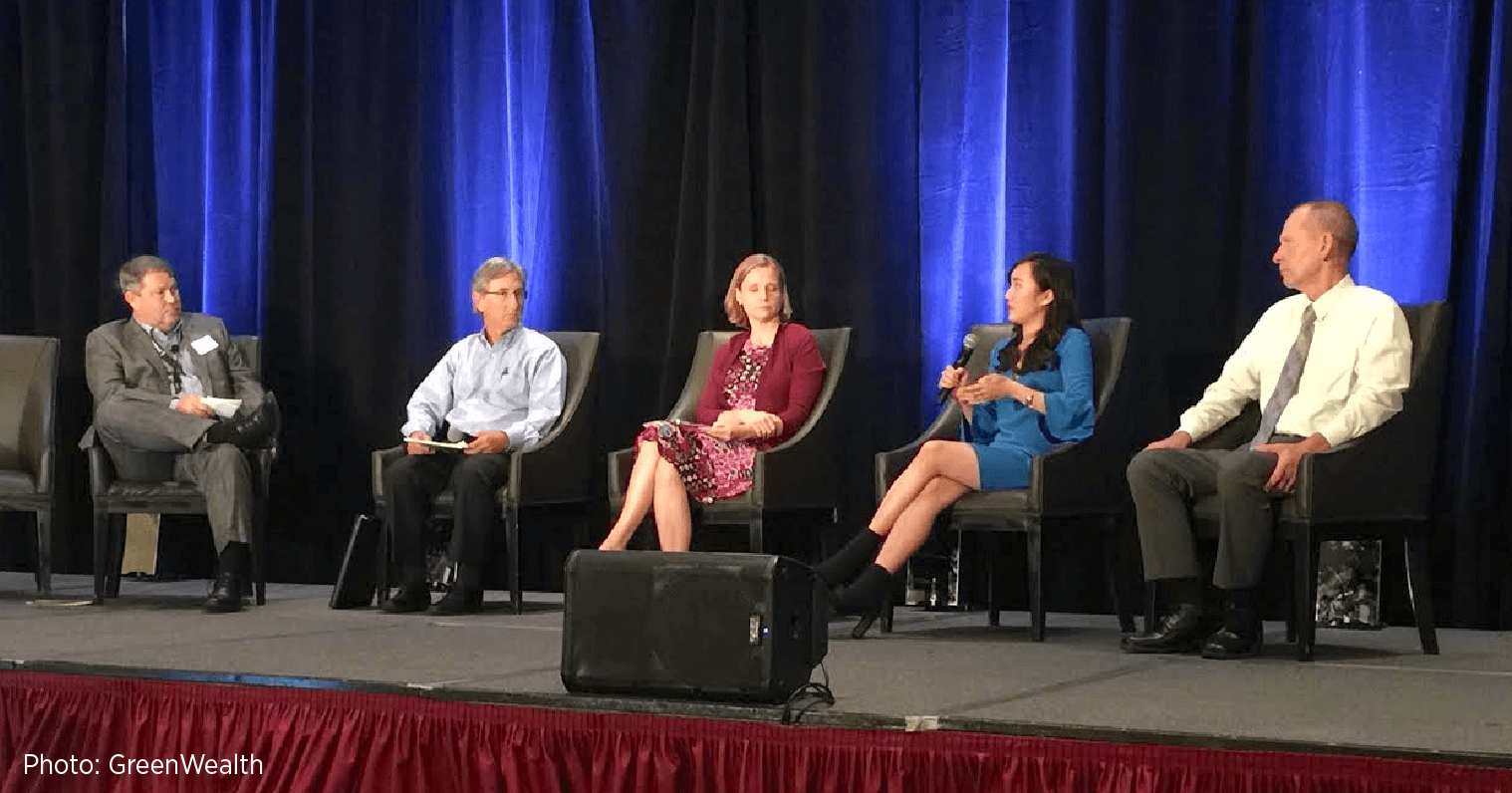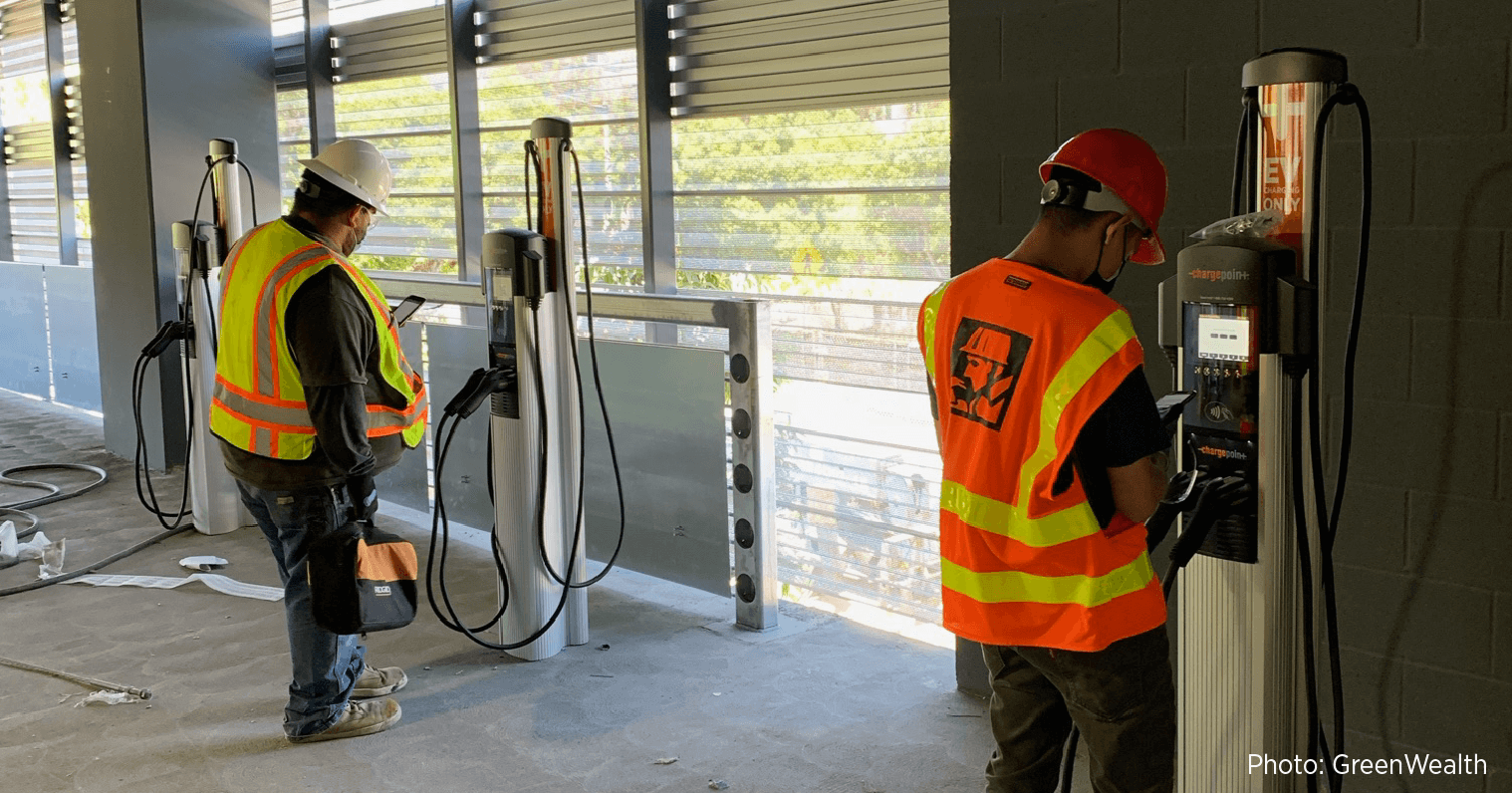
Ariel Fan began her clean energy career in college, walking door to door helping hotels and small businesses in Manhattan save energy through free LED lighting programs. She realized quickly that green building technologies and incentives were poorly understood by the general public and made it her mission to educate building owners and property managers about clean energy options.
Today, as the founder and CEO of GreenWealth Energy, California’s first certified woman- and minority-owned value-added reseller (VAR) offering EV charging solutions and a ChargePoint Premier Partner, Fan continues to emphasize education and access in her approach to providing electric vehicle (EV) charging solutions to her customers.
Tell us about your mission with GreenWealth Energy.
In 2017, I founded GreenWealth to bring clean energy and healthy air to communities. We believe a truly wealthy community is only possible when there’s equal opportunity and access for everyone. So our mission is to democratize clean energy incentives by serving customers of every size — we’ll work with Fortune 50 companies that have properties all over the U.S. but also with small, local businesses or restaurants serving EV drivers that come through their inner-city communities.
It’s also important for us to engage with low-income or disadvantaged communities. These communities tend to be less educated about EV incentives and have historically had less access. So we put in the time to educate them, share resources and provide one-on-one consultation — sometimes on a pro bono basis. But it’s the right thing to do, so we spend that time.
How do you balance building a profitable business with taking on projects that may have limited funds?
When we’re thinking about profitability, there’s the project’s monetary profitability, but there’s also the brand value gained from the relationship we are building through a project. That can contribute to our brand in terms of what we stand for. To me, even a positive testimonial from a client contributes to our profitability.
For similar reasons, we also participate in the overall movement for clean energy. I sit on a few different nonprofit boards, and in my roles, I have met with legislators to help advance their clean energy policy agenda. GreenWealth has also developed relationships within the clean tech entrepreneurial community.
These things might not show up on our balance sheet, but in terms of our trajectory and the size of our opportunities, I think that really is a big part of our value.

What made you realize you could actually start a company solely focused on EV charging infrastructure?
After graduation from Columbia University, I moved to Los Angeles to oversee energy conservation efforts for a hotel chain with a portfolio of 60 commercial buildings across the state, collaborating with utilities to deploy lighting, solar and HVAC upgrades as well as EV charging infrastructure. Because of this work, in 2016, I was recognized as Southern California Edison’s (SCE’s) Energy Efficiency Partner of the Year for deploying more rebate funds than any other individual across the utility’s 15 million customer territory.
That award usually goes to very large businesses — not to people new in their careers, not to women and not people of color. That really set me apart. I actually spoke at SCE’s internal management meeting, with the CEO and president listening as I gave feedback on how they could improve their customers’ experience with rebate programs. It became obvious to me that this was truly an emerging industry if someone under 25 could come out as a thought leader.
I also realized what a big gap existed between the availability of funds out there to pay for these upgrades and business owners’ awareness. Because larger companies often have a dedicated sustainability officer and greater buying power, they had easy access to the incentives. But the small and medium-sized businesses would often get left behind because they just didn’t know that the funds exist. That’s where I saw an opportunity to give back.
What are the most common stumbling blocks you encounter when helping small business clients incorporate EV charging?
Sometimes the reason they can’t move forward is because of budget. So we take a consultative sales approach to bring in outside financial resources to help our clients find creative financing. We can help with private financing and other mechanisms to help reduce the upfront costs, whether it’s accessing the credits, rebates and incentives; setting up a revenue share on the charging revenues; or establishing a contract for ChargePoint as a Service. Customers are often aware of the technology innovation on the hardware and software side of things, but there’s so much happening behind the scenes in terms of financing, and a lot of people don’t know that.
What advice do you give to clients who are unsure of how to approach fleet electrification?
When it comes to fleet, many customers think they first need to set up their EV charging infrastructure, but actually it’s important to first understand what type of vehicle best fits their needs and then build the charging infrastructure for those vehicles. What type of vehicles do they already have — medium, light or heavy duty? And how are they being used? While electrification may fall under sustainability or environmental initiatives, it’s important to discuss the situation with operations and the teams who are actually going to be using those vehicles.
Next, one of the most important things is to find the best rebate and incentives available because everything else will follow if you can find a way to pay for the project. When working with clients, I ask where the properties are located. From there, someone from ChargePoint or GreenWealth can determine what utility rebates or regional grants are available for each location.

As a ChargePoint partner, how does GreenWealth approach the electrification movement today?
I think it’s still a grassroots movement in a way. When I think about the ecosystem I work within, you have the contractors, the electricians and other consultants. As a ChargePoint partner, we interface with a lot of other VARs. We’ve had opportunities to work collaboratively on projects because perhaps their expertise was only on the installation side, where we could step in and work with the customer. We’ve referred business to other ChargePoint partners when they were a better fit. So it’s a collaborative, community-based effort to educate. We are all partners under the ChargePoint umbrella, and we want to protect that business too. If ChargePoint does well, we all do well.
